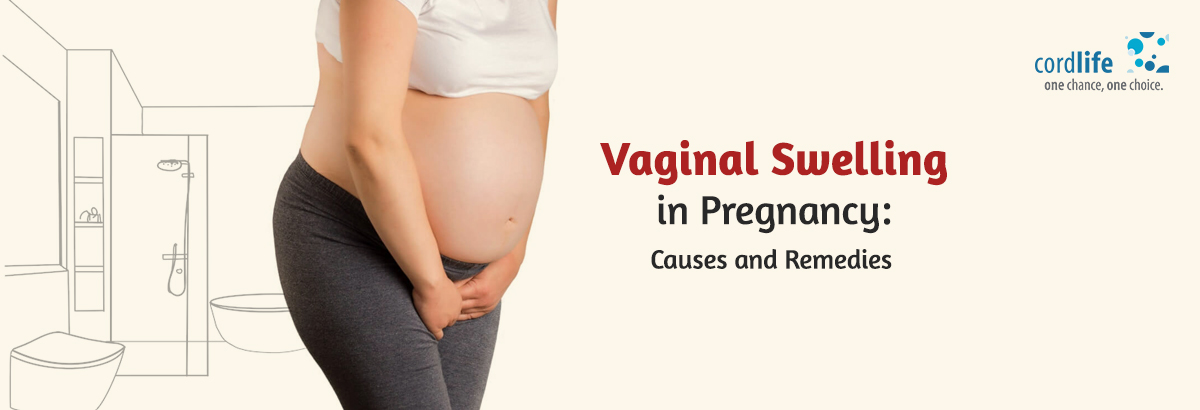Table of Contents
As you progress in the pregnancy journey, the belly grows, and with the hormonal changes, it’s normal for you to feel tired, anxious, cramped, swollen etc. It is common to experience swollen hands, legs, and other body parts, including the vagina during pregnancy.
What is Vaginal Swelling During Pregnancy?
A swollen vulva is a common pregnancy symptom. Inflammation of both the external genitalia and the internal genitalia is known as vulvovaginitis. This is like a swollen labia or clitoris. Labia is the lips of the vagina forming its outer opening. As the pregnancy advances, you may feel a sense of fullness, irritation or itching in this area.
What are the Symptoms of Vaginal Swelling During Pregnancy?
Vaginal swelling varies from woman to woman, but hormonal changes during pregnancy can cause the following symptoms:
- The vulva and vaginal area feel noticeably big or puffy.
- There is a general feeling of fullness in the vaginal area.
- Some women may feel a bumpy texture due to varicose veins.
- In severe cases, the swollen area may look bluish.
- Itching in the affected areas.
- There might be a sharp stinging sensation during urination.
- Vaginal discharge can also be a common symptom during pregnancy. It becomes a little thicker and whiter than usual. (The reason is the cervix and vagina change during this time thus increasing the mucus plug production).
- Performing the Kegel exercises during the whole pregnancy journey, labour and childbirth.
What Can Cause Vaginal Swelling During Pregnancy?
Vaginal swelling may start as early as the first trimester and progress with pregnancy, which is completely normal. The causes of vaginal swelling include:
Hormonal Fluctuations
Hormonal flux during pregnancy, that is due to the rise of the pregnancy oestrogen hormones, there might be swelling in the tissues and blood vessels in the vagina. The hormonal shift can also lead to the widening and relaxation of the vaginal area, contributing to swelling.
Pressure on the Pelvic Region
From the first trimester to the last, as your baby grows in the uterus, it exerts pressure on the uterus. You enter the last stage of pregnancy and your “baby drops”. It applies more pressure in the pelvis region. (Your baby slowly slides down the pelvis and vagina to take the right position to move out of the womb). Moreover, the head of your baby moves into the pelvis in preparation for labour. This whole journey of pregnancy can give rise to vaginal swelling.
Increased Blood Flow
Pregnancy increases blood volume by 30% to 50% to support growing baby. This extra blood flow makes the heart work harder, increasing heart rate, especially during labour. This may make the vaginal area swell.
In addition to this, vaginal swelling occurs as a result of the age, weight and family history of a mom-to-be.
How to Reduce Vaginal Swelling During Pregnancy?
There isn’t much you can do to get relief from vaginal swelling during pregnancy. However, here are a few things that you can try out:
- Wipe the area from front to back.
- Use cotton underwear to allow your genital area to breathe and stop yeast infections from growing.
- Stay hydrated as you might feel the burning sensation due to vaginal swelling. Drink plenty of water and let the bacteria out of your body.
- Apply cold and hot packs to ease vaginal swelling and inflammation.
- Increased intake of probiotics helps balance the bad bacterial and yeast overgrowth. Include yoghurt and buttermilk in your diet.
- Stay away from scratching. You may feel itchy, oozy, and a little uncomfortable. If there are “bad bacteria” present in the vagina that is making you feel itchy, scratching can spread the infection.
- Stay away from douching. It is possible to wipe out the “good” bacteria by douching your vagina.
- Keeps your legs elevated, prop them on pillows, while you’re lying down to promote circulation.
Overall, while vaginal swelling is normal during pregnancy, it is always recommended to discuss any concerns with your healthcare provider. Only the healthcare practitioner can tell you whether you need medical treatment or not.
